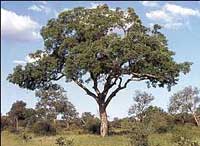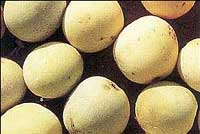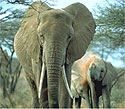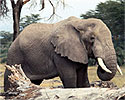 |
Do Wild Elephants Get Drunk? |
Have you heard that wild African elephants get drunk by eating fruit? Many people believe that elephants consume alcohol by eating the marula fruit. Dr. Steve Morris and two colleagues from the University of Bristol (Bristol, United Kingdom) were skeptical of these claims and wanted to find the real story. The scientists set out to answer three questions:
Marula Fruit and AlcoholThe marula, a member of mango family, is a tree found in southern Africa. Although one study estimated that the fruit of the marula tree contains 7% alcohol, other studies have found that the alcohol content of the fruit is less than 1%. The alcohol content of the fruit may increase to about 3% when the fruit falls to the ground and ferments.
Marula Fruit and ElephantsElephants eat food that is equal to 1 to 2% of their body weight each day. In fact, most of an elephant's waking hours are spent eating. Marula fruit is one food that elephants eat.Marula Fruit and IntoxicationThe researchers estimated that 1.9 liters (0.5 gallons) of pure alcohol (ethanol) would be required to intoxicate a 3,000 kg elephant. To estimate how much marula fruit would be needed to intoxicate an elephant, the scientists assumed:
Given these assumptions, an elephant would have to consume 27 liters (7.1
gallons) of 7% alcohol to become drunk. This volume of fluid would NOT
"... drunken elephants seem highly improbable."
The Myth of the Drunken ElephantWild elephants do sometimes show unusual behavior, but alcohol is unlikely to be the cause. Dr. Morris suggests that three alternative explanations for strange elephant behavior:
|
|
Did You Know?
|
|
|
Reference: Morris, S., Humphreys, D. and Reynolds, D., Myth, Marula, and Elephant: An Assessment of Voluntary Ethanol Intoxication of the African Elephant (Loxodonta africana) Following Feeding on the Fruit of the Marula Tree (Sclerocarya birrea), Physiological and Biochemical Zoology, published electronically on February 6, 2006. |


 fit into 714 marula fruits because the volume of a single fruit is only 22
ml! The only way an elephant could become drunk is if it did not drink
any water, ate only marula fruit with a 3% alcohol level and ate 400% more
than its normal diet. Therefore, the researchers conclude:
fit into 714 marula fruits because the volume of a single fruit is only 22
ml! The only way an elephant could become drunk is if it did not drink
any water, ate only marula fruit with a 3% alcohol level and ate 400% more
than its normal diet. Therefore, the researchers conclude:
![[email]](./gif/menue.gif)
![[newsletter]](./gif/menunew.gif)
![[search]](./gif/menusea.gif)